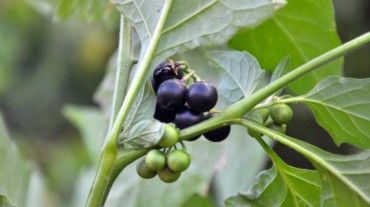
A team of pharmacologists and researchers in search of plant compounds that could help with Covid-19 treatment has found an edible weed that showed promise in lab studies. Researchers from Delhi Pharmaceutical Sciences and Research University found it in Delhi’s Aravalli Biodiversity Park, which they have been visiting since March.
In molecular docking studies conducted recently, Solanum nigrum (black nightshade; Makoy in Hindi), a weed and a vegetable commonly consumed in many parts of the country, the team says they found remarkable results.
Their research showed its constituents bind with ACE 2 (an enzyme the Sars-Cov-2 virus uses to enter the body) and have the potential to inhibit viral replication; cytokine storm and inflammation.
“We wanted to develop a phytopharmaceutical drug. Professor CR Babu (Professor Emeritus, Delhi University) who developed the Aravalli Biodiversity Park had guided us through the park and helped us collect samples from eight potential plants. At that time, we didn’t know much about the pathogenesis of the disease, so my team and I first worked on that and wrote a paper on how the disease impacts the body,” said Professor Ramesh K Goyal, Vice Chancellor of the University.

Based on the first 206 Covid-19 deaths reported in India till April 10, Goyal’s team published a paper in Elsevier’s Diabetes Research and Clinical Practice journal which concluded, what is now well known, that patients with cardiovascular diseases, diabetes mellitus and hypertension are at greater risk of developing Covid-19 infection. The team tried to understand the clinical characteristics of Covid-19 with the renin angiotensin system (RAS), hormonal system that regulates blood pressure.
“In drug discovery, one of the mechanisms used is to see how the chemical compound interacts with the body through molecular modelling studies. The score from modelling gives us an idea of how the drug will perform. By the end of April 2020, it was very clear that Covid-19 has close molecular links with angiotensin converting enzyme-2 (ACE2) — (an enzyme the Sars-Cov-2 virus uses to enter the body) and Open Reading Frame protein (ORF8)—a serological marker,” said Jaseela Majeed, associate professor at the University.
“ACE-2 in particular seems to be the main culprit for every complication of the patient like cytokine surge, inflammation and thrombotic events. Unfortunately, even today, no drug that inhibits ACE2 is available. We found that some constituents of black nightshade interact with ACE2 and its associated receptors. The docking scores for the compounds present in Solanum nigrum were higher than some repurposed drugs being used currently and also when compared with other phytochemicals under clinical trials. Our colleagues Professors Rajiv Tonk and Ajit Thakur are working on validating these results,” explained Mahaveer Dhobi, associate professor at the University.
Based on some preliminary clinical evidence, results of which are still being compiled Goyal said the drug once developed could be useful for symptomatic patients unlike other plant-based interventions which are prophylactic in nature. The team’s initial research results will be available in Reviews in Cardiovascular Medicine journal soon.
The University team has prepared a formulation for the clinical trial permission and are in the process to get the support from various statutory and funding agencies.

The Council of Scientific and Industrial Research (CSIR) is also in the process of developing a phytopharmaceutical drug for Covid-19. “The US FDA in 2005 approved phytopharmaceuticals as botanicals. In 2015, phytopharmaceuticals were also approved by the DGCI but since then there were no trials conducted. We now have ACQH which is in phase II of clinical trials. Its safety is demonstrated. We believe ACQH to be antiviral,” said Shekhar C Mande, director general, CSIR.
Select Topics of your interest and let us customize your feed.
PERSONALISE NOW“Phytopharmaceuticals work slightly differently from one cause-one purified compound theory of modern medicine. This involves extract of a compound which has a signature. But this is different from Ayurveda. It follows the same guidelines as modern medicine,” Mande added.
“Phytochemicals are coming up in a big way. They provide hope in supportive or palliative care but will take a long time in becoming a therapeutic solution. Docking studies are done on a computer but we have to see how they work on the body.
Researchers are studying anti-viral agents of all kinds but my personal feeling is that it will be a long way because the virus multiplies very rapidly,” said Dr Shobha Broor, former head, department of microbiology, All India Institute of Medical Sciences (AIIMS), Delhi
“Some phytopharmaceutical drugs for Covid-19 are already undergoing trials. They are different from Ayurveda or those specified in classical texts. These are purified and well characterised extracts from plants which are then standardised trough chemical, animal and clinical trials,” said Dr VG Somani, Drugs Controller General of India.